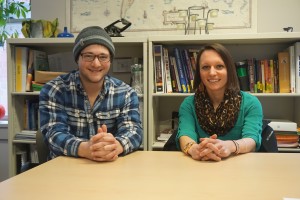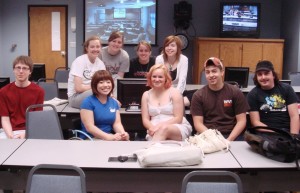この記事は次の言語でも読めます:日本語
Nowadays more students choose to go to college to get more knowledge and experience to prepare them for a better career, so do students with disabilities.
Syracuse University, located in Syracuse, New York, has various kinds of support and opportunities for students with disabilities.
The other day, I had an opportunity to talk with Mr. Sam Roux (ACCESS College Coordinator) and Ms. Brianna M. Shults (Internship and Employment Coordinator).

They shared a very exciting program named “Project SEARCH”, which started last December.
Students with disabilities go through a yearlong internship on campus.
They go to 3 different internship sites for 10 weeks each.
All week, the students come to classroom for 45 minutes and learn skills for job readiness such as arriving on time, communication with coworkers etc. in the morning.
Then they go to internship sites and work for 4 hours. After working, they review for 30 minutes.
The program goes from Monday to Friday, so they work 4 hours X 5 days = 20 hours per week.
Although it is less hours than actual full-time work, 20 hours per week could be really tough for them and good amount for start because those students don’t really have working experience before.

The students with disabilities pay for the program fee from their Medicaid money from New York State and the US government.
Medicaid money is given to people with disabilities.
It is like a budget that they can use to get service or support.
In the past, people with disabilities needed to consult with agencies, and the agencies select service or support.
Therefore, sometime, those service and support were not perfectly matched what people with disabilities really need.
Last year “Self-Direction” has started, and people with disabilities receive a budget (set amount of money for the year) and then they decide which vendors they want to use.
The government directly pays the money to the vendor, no agencies in the middle.
This way, people with disabilities can receive service or support they need and also can use limited budget wisely with the assistance of their broker (the person assigned to assist them with using their budget).

Doing internships during college year is very common in the US. By doing so, students would be able to get skills and experience of working as well as business manners; which helps with the job search.
However, for students with disabilities, it is difficult to find a place to intern because some employers don’t have enough understanding of accommodations, resource to assist them, or the intern is limited by the availability of public transportation.
In Japan, doing internships before having a full-time work is getting more common.
Instead of doing internship, college students often work part-time.
When I was a college student in Japan, I wanted to work as a part-timer too, so I called some companies.
The open jobs were like general admin work or teaching English to junior high school students in a one-on-one setting which my walking disability does not affect the performance.
As soon as I told them that I use a wheelchair, however, “Oh, no way. No way.”
They didn’t even try to hear my body situation, but just kept denying me.
It was because the place I lived was more countryside which had less understanding for people with disabilities.
Also companies cannot count me as a employee with disabilities to meet the quota requirement mandated by the Ministry of Health, Labor and Welfare, if I work part-time.
Due to companies’ negative reactions, I just gave up trying harder to get a part-time job.
Luckily in the end of freshman year, I got an offer from my friend to work at a place near my apartment.
So I worked and saved some money to study abroad in Wisconsin, US.

Also in Wisconsin, I could work part-time in classroom and Global Connections office on campus too.
Thanks to those opportunities, I got precious experience of working before graduation.
I have been so lucky.
Usually students with disabilities in Japan don’t get this kind of experiences.
It would take more time to learn and adjust to their job description when they start working for the first time.
It would also take a couple years for employees with disabilities and without disabilities to form good communication to reach mutual understanding of each other in the first few years.

Working experience during college years would really make difference in students’ future career.
Since students don’t have enough negotiation skills and strong power to consult with companies, colleges can play a role of broker to help them.
If the colleges are located in or near a big city, negotiate with major companies.
Some of them already know the importance of giving working opportunities for students with disabilities.
On the other hand, colleges in country side would have stronger connections with the local community.
They could collaborate with local stores and companies.
The population of younger generation is decreasing in Japan*, but the quota percentage for employment for people with disabilities is increasing every few years**.
Companies can offer talented students with disabilities internships to see if the students qualify for the job instead of being required by the quota system and hiring a person with disability who does not qualify the job.
If more students with disabilities get an opportunity to work, they would figure out what they are good at, what they need to improve, what they want to try in the future.
Those findings help people with disabilities build better career and encourage better employment for them eventually.
*Research by Statistic Japan in January 2016
** Press Release by Ministry of Health, Labour and Welfare in Japan in May 2012
